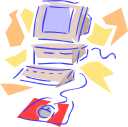
Technology Tip of the Month
by Deborah Healey
Sometimes a general purpose CALL lab isn't enough, and you want something that focuses on writing. The Tech Tip for this month explores setting up a writing lab -- some of the considerations and some useful links. Writing labs generally focus on one of two basic directions, either teacher-led classes that emphasize writing or drop-in tutorial sessions.
Grammar/style checkers
Pre-writing software, such as brainstorming and outlining tools
Vocabulary, grammar, and spelling software for English language learners
Sometimes collaborative writing software, such as Daedalus or Common Space
Daedalus Interactive Writing Environment (DIWE) from Daedalus (https://www.daedalus.com)
Common Space from Sixth Floor Media (https://www.sixthfloor.com)
Collaborative writing programs make it easy for teachers and students to read each other's work and annotate it. Shared writing often shows up in columns, so that annotations are kept separate from each other and from the original. The software often makes it easier to see various drafts, as well. Microsoft Word offers some ability to track drafts, but not nearly to the same degree as the commercial collaborative writing programs. Benefits do not come cheaply, however. DIWE starts at between $100 and $125 per station, and Common Space at about $90 per station. Elements of DIWE will run on an individual computer (brainstorming, for example), but Common Space requires a network to operate. Both run on Microsoft NT, Novell, or Macintosh networks. DIWE requires a local area network (LAN). Common Space will run over a local network or over the Internet, so distance education students can also participate.
DIWE offers several pricing options. Check with Daedalus to see if they will honor the current website price of $99 per station (the sale was scheduled to end August 15, 1999.) Email info@daedalus.com, 1-512-459-0637 (voice), or 1-512-452-5206 (fax) when you are ready to order.
Lab License: Determine the number of workstations that will be running DIWE at the same time (on individual machines or from the server), and purchase for that number of stations (not users). The Lab License has no yearly maintenance fees; however, software upgrades are free only during the first year after purchase.
Site License: Identify the full-time equivalency (FTE) figure for your campus or district for the current school year, and call for a price quote. If you purchase a Lab License, you can apply 100% of your purchase toward a Site License within a year of your initial purchase date. The Site License has no yearly maintenance fees; however, software upgrades are free only during the first year after purchase.
Annual Lease: Daedalus also offers a year-to-year software lease for 25% of the full price of either Lab License or Site License purchases. Although the lease does not apply toward future purchases, it can be renewed or cancelled annually, and includes the same access to support, upgrades, and teacher resources that full purchases do.
Common Space has English "Multi-user" license pricing that discounts the $90 per unit cost when 50 or more units are ordered. Electronic training is available for all international customers. For off-campus use, students may purchase the CommonSpace Student Edition for $30 per copy. Each package includes a CD-ROM, one Getting Started Guide, one User Guide and one quick reference card. There are no annual fees. Upgrades to the latest version can be purchased for $25 per unit. For more information, contact David Bethune, David_Bethune@hmco.com, 617-351-3148.
On their website at https://www.bgsu.edu/departments/writing-lab/about.html, the Bowling Green State University Writing Lab gives a good summary of what tutors do and do not do.
"Tutors help writers to: understand an assignment, generate ideas, pre-write, develop a thesis, analyze audience, organize and develop ideas, revise earlier drafts, improve proofreading and editing skills, discover their own writing process.
Tutors do not, however, proofread, edit, ghostwrite, or research any writer's work. Each session is a collaborative effort where the writer is in an active dialogue with the tutor as they work together to discover effective writing techniques for the writer."
One of the best-known of the online writing labs is the Purdue Online Writing Lab. It's not just online, though; it also offers drop-in tutoring, writing assistants in classrooms, and a regular computer lab with Windows and Macintosh computers and a variety of software. Information is at https://owl.english.purdue.edu/our-lab/introduction.html.
An interesting EFL writing lab is the online writing lab for Temasek Polytechnic (Singapore) at https://www-eng.tp.ac.sg/tcs/TCS2000/TCS2000.html. The first year starts as with teacher-led courses, and the course in Technical Communication Skills is done entirely via self-study in the second year .
I hope this has given some food for thought. Do feel free to write me
with suggestions for other great sites
If you have questions, comments, or for more information,
contact Deborah Healey, dhealey AT uoregon DOT edu
https://www.deborahhealey.com/techtips/dec1999.html
Last
updated 26 June, 2009